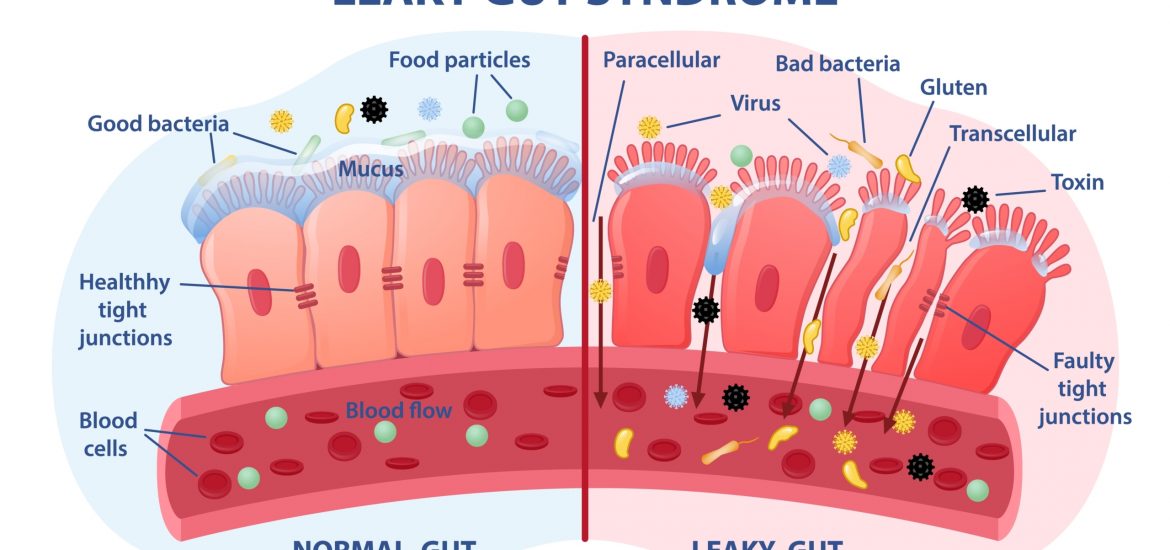There are some medical conditions concerning the gut which are not yet well understood by medical science. Among these are Irritable Bowel Syndrome (IBS), which is a diagnosis made when other issues have been excluded, and also Leaky Gut Syndrome.
Leaky Gut Syndrome has, for a long time, been recognised only by naturopaths and other natural health practitioners. Now, however, it is gaining increasingly more traction within the medical sphere and medical scientists are conducting studies into its role in overall gut health.
The Gut
The gut or gastrointestinal tract is the hollow tube that runs from the mouth to the anus. It is the series of organs through which the food and drinks that are consumed travel from the mouth through the body before the elimination of waste products, and it is where digestion and the absorption of nutrients take place.
These organs include the small intestine and the large intestine (or colon).
The lining of the intestines is comprised of certain types of glandular cells. These cells are tightly aligned and they have a protective mucous layer covering them; this protects the inner wall of the intestines from damage by food residues, digestive enzymes, and the bacteria found in the gut.
The Microbiome
An important aspect of the gut is the microbiome. This refers to the colonies of bacteria that live within the gut and which play important roles in immune function and nutrient metabolism, and which help protect the body from pathogens and support the structural integrity of the mucous layer in the lining of the gut. A healthy balance of beneficial gut bacteria is essential for the optimal function and health of the microbiome and, ultimately, the entire body.
What is Leaky Gut Syndrome?
The microbiome works in tandem with the gut lining mucosa to ensure that harmful bacteria and other microorganisms, toxins, and undigested particles of food do not leak out of the gut and into the bloodstream. If this mechanism fails, the intestines can become increasingly permeable and a leaky gut can occur.
Diagnosing leaky gut syndrome is very difficult, and it currently remains, to a large extent, a proposed gastrointestinal disorder.
Leaky gut (or increased intestinal permeability) has been associated with several conditions including food allergies, Irritable Bowel Syndrome, Type I diabetes, Crohn’s disease, inflammatory bowel disease, and Coeliac disease. It is not understood whether it is the cause of or a symptom of these.
Symptoms and conditions associated with increased intestinal permeability or leaky gut include:
- Chronic bloating, constipation, and/or diarrhoea
- Fatigue and chronic fatigue syndrome
- Headaches
- Nutritional deficiencies
- Immune dysfunction
- Food sensitivities, intolerances, and allergies
- Issues with concentration
- Joint pain or arthritis
- Skin issues – eczema, acne, rosacea, and other rashes
- Candida overgrowth (thrush)
- Seasonal allergies and asthmatic symptoms
- Systemic inflammation
- Hormonal imbalances
- Autoimmune diseases
- Mood disorders including anxiety, depression, ADHD
What Causes Leaky Gut?
Scientists are currently unsure whether leaky gut is a symptom of a disease or the cause of the disease in itself.
Some theories on possible causes of this condition include:
- An unbalanced microbiome, due to poor diet, chronic stress, infection, low immunity, antibiotic use, and other causes. This can enable harmful bacteria to multiply and trigger the release of inflammatory markers. This may increase gut lining permeability.
- Inflammation, which can be stimulated by unbalanced gut microbiota as well as by vitamin deficiency, especially for vitamins D, A, and zinc.
- Overstimulation of the protein zonulin, which can weaken the bonds between the cells lining the gut and allow leakage. This can be caused by exposure to gluten and specific strains of bacteria.
- Excessive alcohol intake can alter the microbiome, as well as disrupt the junctions between cells.
- Non-steroidal anti-inflammatory drugs (NSAIDs)can damage the lining of the gut. This triggers inflammation and disrupts the normal, healthy mechanisms which regulate intestinal mucous secretion and blood flow.
- Toxins can contribute to leaky gut syndrome. These include but are not limited to aspirin overuse, antibiotics, pesticides, and contaminated drinking water.
- Other risk factors include infections, antibiotic use, and autoimmune disorders.
Prevention and Treatment Tips
1. Eat a healthy diet rich in high-fibre, prebiotic foods. This help to support the microbiome and should include wholegrain cereals, vegetables, fruits, legumes, and nuts.
2. Limit or avoid saturated fats, processed foods, refined oils, refined sugars and other carbohydrates, as well as foods that trigger allergies or sensitivities for you (e.g., gluten, dairy). These can compromise the diversity of the bacteria in the gut and may increase inflammation in the body.
3. Drink plenty of plain water.
4. Moderate alcohol consumption.
5. Take probiotics for digestion and eat probiotic-rich foods. These foods and supplements contain beneficial bacteria and can be a very powerful, effective way to help rebalance the gut microbiota and prevent Leaky Gut Syndrome. These foods include yoghurt, kombucha, sourdough bread, kefir, miso, apple cider vinegar, and sauerkraut.
6. Limit your use of non-steroidal anti-inflammatory drugs (NSAIDs) which include ibuprofen, aspirin, naproxen, etc. Talk with your doctor if you require these as there may be suitable alternatives.
A healthy gut is essential for a healthy body and mind. If you are experiencing any symptoms of gut imbalance, chat with your doctor or pharmacist.

